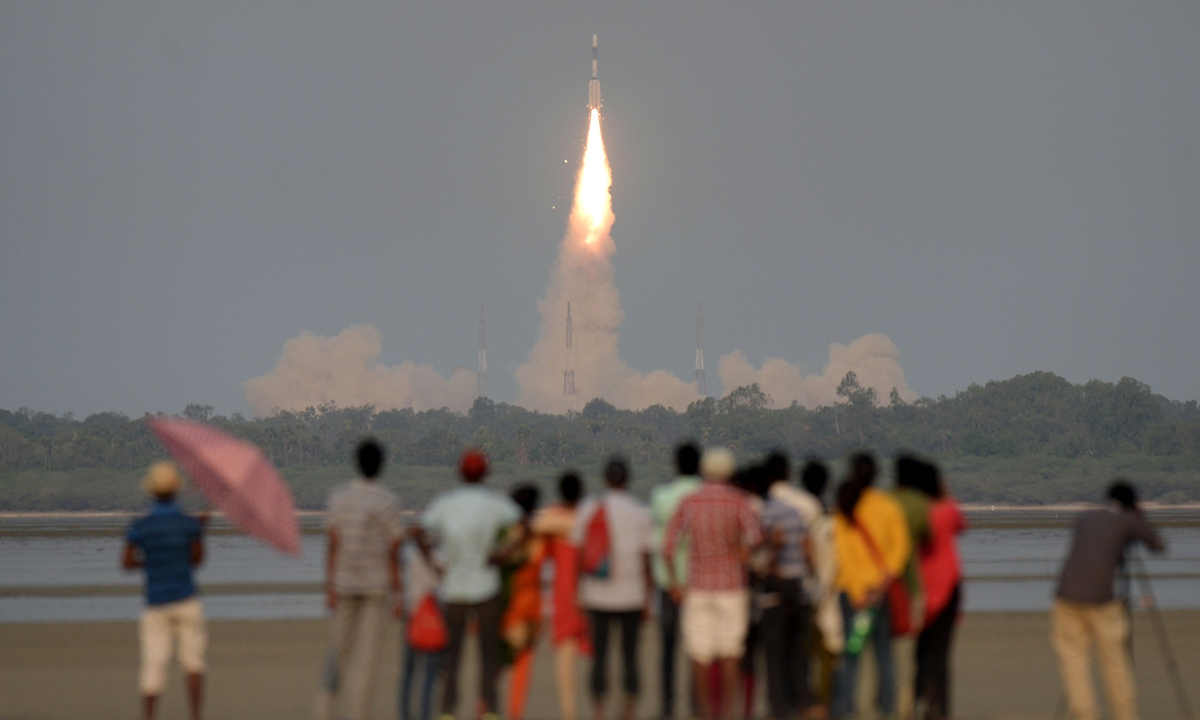
Indian onlookers watch as the Indian Space Research Organisation's (ISRO) GSAT-6A communications satellite launches on the Geosynchronous Satellite Launch Vehicle (GSLV-F08) from Sriharikota in the southern state of Andhra Pradesh on March 29, 2018. File Photo: VCG
Indian media and analysts are trying to boost confidence on India's ambitious plans for a space station amid suspicion and doubts, a mysterious logic that put a target on themselves to be mocked by some Chinese netizens. But, at the same time, other netizens and analysts said that space is free for any country or anyone to explore and they expect to see neighbor India realizing its dreams.
As China gears up to become the only country to have an exclusive space station, its neighbor India also has plans to follow suit in a few years.
While China could become the country to have the only space station in operation, by 2024 or 2030 at the latest, India's Minister of State for Science and Technology and Earth Sciences, Jitendra Singh, announced in the parliament that India's first space station would be set up by 2030. The country's long-awaited human spaceflight "Gaganyaan" is slated for launch this year.
The announcement encountered controversial responses as some locals criticized the Indian government as the plan is apparently too ambitious for the current situation of the Indian economy.
Amid the controversy, local media The EurAsian Times tried to defend the government's ambitions with a mysterious logic of comparing the timelines of China and India's development in aerospace industry in a report on Monday. Its Defense Analyst and Managing Editor, Nitin J. Ticku, said that "if you see the track records of China and India in tandem, you get a clearer picture and also a fair idea about India's space station. Starting from the nuclear test to the ASAT test, India has been catching up to China, pretty fast."
China conducted its first nuclear test in 1964 and India caught up in 1974. Beijing sent its first lunar mission Chang'e 1, in 2007, and New Delhi followed suit with its Chandrayaan 1, in 2008. China conducted its first ASAT mission in 2007 and India had it in 2019. "So, ideally, now that China has launched its own space station, history shows that India could have its own space station by 2030 as the Indian Space Research Organization has announced," Ticku said.
The report soon became a hot topic on Chinese social media on Wednesday with more than 130 million views on the related hashtag. Some Chinese netizens also mocked India for laying out such plan out of ambition to compete and win over China.
"China initiated its manned spaceflight project in 1992 and is scheduled to complete the in-orbit construction of its space station by the end of 2022 after 30 years. India kicked off the project in 2007 and says it will have a space station by the end of 2030, which is very ambitious," a netizen commented.
"India has no experience in manned spaceflights. It also has some technological gaps in rockets used in manned spaceflights and has not even launched an unmanned spacecraft. So, it is talking big to some extent by announcing such plan," a Beijing-based expert on aerospace told the Global Times on Wednesday.
"But it is not impossible for India to realize the plan as it could cooperate with countries with experiences in the area, such as Russia," the expert said.
Others said that they expect to see India achieve its goal, noting that it should not be despised in the aerospace industry given its rapid progress in recent years. It also has advantages in international cooperation and high cost-effective products.
In 2014, India became the only country in the world that has succeeded in its first attempt to send a probe to the Mars. Its Mangalyaan Mars probe has been working for more than seven years and the country also set a world record in launching 104 satellites on a single mission in 2017.
It is very likely that India will become the fourth country in the world to develop independent manned spaceflight technology, Chinese analysts said.




